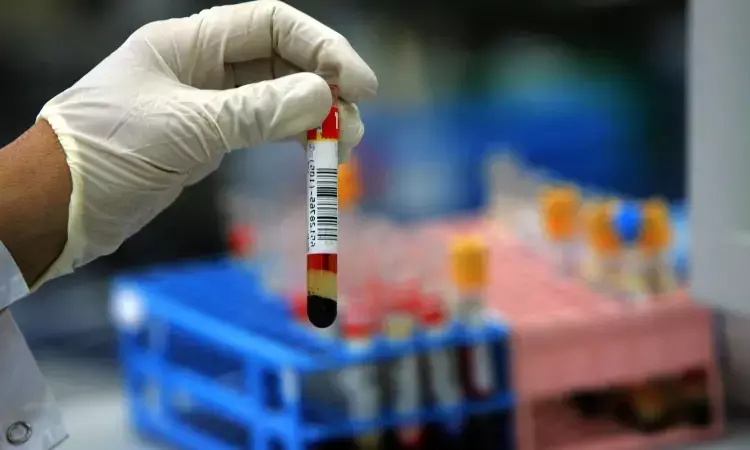- Home
- Medical news & Guidelines
- Anesthesiology
- Cardiology and CTVS
- Critical Care
- Dentistry
- Dermatology
- Diabetes and Endocrinology
- ENT
- Gastroenterology
- Medicine
- Nephrology
- Neurology
- Obstretics-Gynaecology
- Oncology
- Ophthalmology
- Orthopaedics
- Pediatrics-Neonatology
- Psychiatry
- Pulmonology
- Radiology
- Surgery
- Urology
- Laboratory Medicine
- Diet
- Nursing
- Paramedical
- Physiotherapy
- Health news
- Fact Check
- Bone Health Fact Check
- Brain Health Fact Check
- Cancer Related Fact Check
- Child Care Fact Check
- Dental and oral health fact check
- Diabetes and metabolic health fact check
- Diet and Nutrition Fact Check
- Eye and ENT Care Fact Check
- Fitness fact check
- Gut health fact check
- Heart health fact check
- Kidney health fact check
- Medical education fact check
- Men's health fact check
- Respiratory fact check
- Skin and hair care fact check
- Vaccine and Immunization fact check
- Women's health fact check
- AYUSH
- State News
- Andaman and Nicobar Islands
- Andhra Pradesh
- Arunachal Pradesh
- Assam
- Bihar
- Chandigarh
- Chattisgarh
- Dadra and Nagar Haveli
- Daman and Diu
- Delhi
- Goa
- Gujarat
- Haryana
- Himachal Pradesh
- Jammu & Kashmir
- Jharkhand
- Karnataka
- Kerala
- Ladakh
- Lakshadweep
- Madhya Pradesh
- Maharashtra
- Manipur
- Meghalaya
- Mizoram
- Nagaland
- Odisha
- Puducherry
- Punjab
- Rajasthan
- Sikkim
- Tamil Nadu
- Telangana
- Tripura
- Uttar Pradesh
- Uttrakhand
- West Bengal
- Medical Education
- Industry
Blood test paves way for better heart attack prevention, reveals research

A simple scoring system could revolutionise how doctors prevent heart attacks and strokes by identifying patients most likely to benefit from preventive medications, according to a new study
The breakthrough test, called the TRIPLE Score, measures specific proteins on blood platelets along with the patient's age to help doctors make more informed decisions about prescribing blood-thinning medications such as aspirin and clopidogrel.
Currently, blood-thinning drugs are only given to patients who have already had a heart attack or stroke because these medications can cause serious bleeding in some people. Without a reliable way to predict who might benefit versus who might be harmed, doctors have been unable to prescribe these potentially life-saving drugs preventively to at-risk patients.
The test, which is not yet widely available, is being developed so that it can eventually be used at the point-of-care. This will then be implemented in patient studies to verify that the test can improve their care.
Dr Alexander Bye, lead author of the research at the University of Reading, said: "Around 100,000 heart attacks occur each year in the UK, despite significant progress in preventing them. We must think of smarter ways to use drugs like aspirin if we are going to bring this number down. Our new test will help doctors make sure that patients receive the best treatment and keep their quality of life. Next, we aim to make the test even easier to use by developing a finger prick test, so that it as simple as measuring blood glucose."
Saving lives and saving money
Published this month in Circulation Research, the study team found that their new scoring system successfully identified patients whose blood was more likely to form clots in laboratory tests. The results also aligned with existing risk scores that doctors use to predict a patient's likelihood of having a heart attack in the next 10 years.
The test requires only a small blood sample and could be developed into a straightforward tool that any healthcare provider could use, not just specialists.
Professor Neil Ruparelia, a cardiologist at Royal Berkshire Hospital who was involved in the study, said: “This test could transform heart attack prevention in the NHS. Right now, we're caught in a difficult position - we have medications that can prevent heart attacks, but we can't safely give them to everyone who might benefit because of bleeding risks. With this new test, we can finally identify which patients would benefit most from preventive treatment. For cardiology departments across the country, this means we could protect thousands of at-risk patients while potentially saving the NHS millions in emergency care costs."
The breakthrough comes following the formation of a new University of Reading spin-out company, HaemAnalytica, which was set up to enable wide access to new platelet function tests and to personalise approaches to prevent and treat thrombosis.
Dr Kamal Kant Kohli-MBBS, DTCD- a chest specialist with more than 30 years of practice and a flair for writing clinical articles, Dr Kamal Kant Kohli joined Medical Dialogues as a Chief Editor of Medical News. Besides writing articles, as an editor, he proofreads and verifies all the medical content published on Medical Dialogues including those coming from journals, studies,medical conferences,guidelines etc. Email: drkohli@medicaldialogues.in. Contact no. 011-43720751


